Building the Herd: A Study in How Complicated Simplicity Can Be
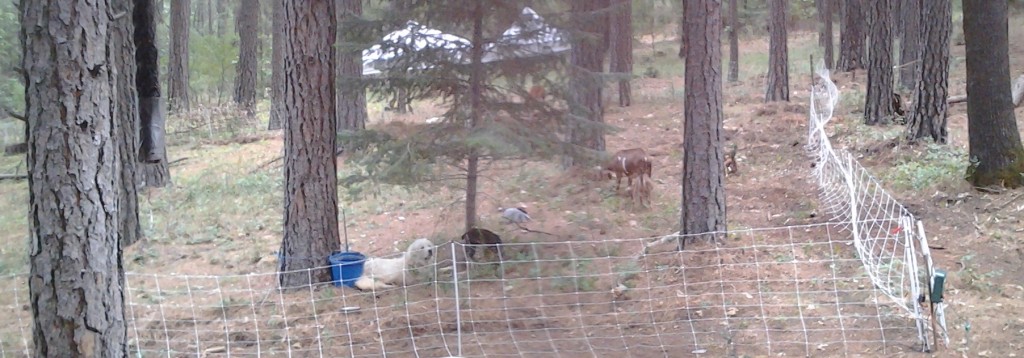 When I started this website and subtitled it “Wren Tuatha’s Complicated Adventures in Simple Living,” I wanted to emphasize the point that simplicity as a value doesn’t mean doing what’s easiest, or even simplest (most expedient) in the moment. Rather, it’s about keeping one’s impacts simplified. That can get very complicated!
When I started this website and subtitled it “Wren Tuatha’s Complicated Adventures in Simple Living,” I wanted to emphasize the point that simplicity as a value doesn’t mean doing what’s easiest, or even simplest (most expedient) in the moment. Rather, it’s about keeping one’s impacts simplified. That can get very complicated!
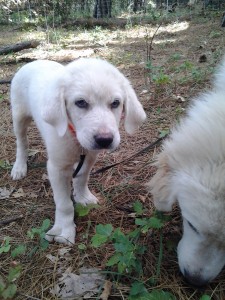 I was just rereading The Art of Raising a Puppy, by the Monks of New Skete. They describe the dynamic in which a dog owner who has lost a mature, elderly dog gets an energetic, untrained puppy. They then judge that pup through the biased filter of their old dog’s obedience and socialization. I could easily have that bias as I build a new herd, remembering how my old goats back in Maryland were so free and easy to be with. We had flow. I forget all the years it took to build up to that state of being. I forget the conflicts with my community mates and fetching the goats out of the garden. I forget work sessions to install fencing and to build a cob goathouse.
I was just rereading The Art of Raising a Puppy, by the Monks of New Skete. They describe the dynamic in which a dog owner who has lost a mature, elderly dog gets an energetic, untrained puppy. They then judge that pup through the biased filter of their old dog’s obedience and socialization. I could easily have that bias as I build a new herd, remembering how my old goats back in Maryland were so free and easy to be with. We had flow. I forget all the years it took to build up to that state of being. I forget the conflicts with my community mates and fetching the goats out of the garden. I forget work sessions to install fencing and to build a cob goathouse.
I just remember the easy routine the goats created. Wicca and Niabi were up at sunrise, following their daily path to their preferred morning browsing grounds. When I got up they would make their way back to my cabin to talk to me through the windows. After a long day of circling the woods to find the best browsing in relation to the sun and my comings and goings, they would settle in under the house, preferring to sleep there, close to me, completely forgoing the beautiful cob house we built them in their secure pen.
For the last few years that I had goats in Maryland, their gate was almost always open and their pen was just another part of the woods to be eaten. They had evolved that level of freedom with me through trust, bonding, and experimentation.
But Maryland has surprisingly few mountain lions. The equation of having woodland goats in California is very different. And this herd will be different, in mission and relationship to me.
Before, I had pygmy goats as pets. I committed to them the way I would a dog or cat—for life. That included health care, the highest quality food and entertainment I could afford, and lots of loving. I don’t know what the future has in store for me and these animals. I’m sharing them with my landlords. Many things are different.
Simplicity Concept: Let’s get pet goats to clear brush instead of using chemicals or human hours!
Complication 1: Seriously Apex Predators
Lions, coyotes, and bears! Oh my! In this part of the country, if you have a herd or flock of any kind, even chickens, you either have Livestock Guard Dogs or you have losses. We will spend more on dogs than fencing. Since we are only going to have four goats, I have insisted we only need one dog, Tonka.
He’s an eight month-old Akbash/Anatolian/Great Pyrenees mix. But another herd owner wore me down and talked me into adopting Dana, a ten week-old Akbash pup with a deformed paw. Mandy, who has seventy goats, wanted me to have the pup as, the dogs work best in teams. Although my reading suggests LGD’s take two years to mature into the job, Tonka’s doing an amazing job already. He chased a pair of coyotes off just yesterday. He also alerted us when the bottle baby got stuck in a hole. Dogs are a great addition!
Complication 2: Please Fence Me In!
With mountain lions about, evolving goats into being free range is not realistic. Since we want them to clear brush all around the landlord’s forty acres, we’ll need movable fencing. Technology has marched along and the trend now is
electric netting. The shock is quicker and milder than old style fences and the sections are lightweight and easy to move and install. The power can be household current, battery or solar. In the old days I would have thought this inhumane. I remember the jolts the electric fences on our farm would deliver. But each herd member only has to contact the netting a couple of times and they respect the fence forever. The netting also provides some deterrent to predators.
Complication 3: LGD’s Don’t Know Sit
Livestock Guard Dogs are bread to know their job innately and learn what they don’t know from elders on the job. They’re born with the herd and they bond with goats and other dogs, not so much with humans. Their human handler needs to take alpha rank over the dogs but, like many show dogs, basic obedience is not needed or taught. So when we brought Tonka home, he was used to a leash but didn’t heal, sit, stay or down. Sorry, but if I’m going to handle a herd that includes a dog that could approach a hundred-fifty or two hundred pounds, I need him to sit on command.
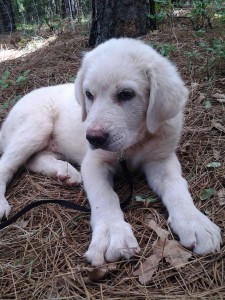
Dana drags a leash to aclimate to it. She'll get surgery soon to improve her deformed right front paw.
Although Tonka is unusual in that he’s submissive and people friendly, the pup Dana wants little to do with humans. According to the Monks of New Skete, I’ve got just three weeks or so to socialize her to a variety of humans, otherwise she will have a very hard life if her deformed paw limits her LGD career. So now I’m a dog trainer.
Complication 4: Some Goats Are Gruff
I previously kept pygmy goats, a dwarf breed. My heaviest goat was maybe seventy pounds. I usually got them upon weaning and was very hand-on. Others I got from pet herds. That’s common with pygmies, which are kept more by fanciers than farmers. So I was used to very tame goats. When I got Ponder, the bottle baby, I knew she would grow to one hundred-thirty pounds. But I’m her mama. She’s tame. But the adult wether and young doeling Mandy gave us came from a herd of seventy brush goats. They’re used to seeing humans, but human touch equals unpleasantness—shots, transportation, and this time, rehoming. 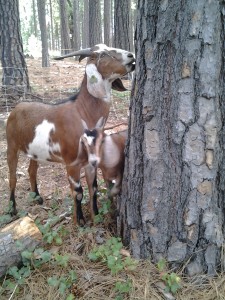 So I have a goat twice the size that I’m used to, he has a huge rack of horns, and he’s not interested in being my friend. Never underestimate the power of feed pellets. You will be mine, Guru!
So I have a goat twice the size that I’m used to, he has a huge rack of horns, and he’s not interested in being my friend. Never underestimate the power of feed pellets. You will be mine, Guru!
Complication 5: Surprise! This Stuff Costs Money!
I’m perfectly clear that I’m starting this herd for enjoyment of their company as well as brush clearing. Otherwise, if brush clearing were the sole benefit, I’m not sure the finances, effort, and time would make good math. Then again, I’ve met several folks who run brush herds for money, so they must make it work on a certain scale. Luckily the landlord and I each have a few collars, halters, leashes, bowls, toys, etc., left over from previous animals. We’re trying to make due with odds and ends we find in these tough economic times. We won’t eat or milk these goats, nor get any fiber from them. So brush clearing and entertainment are our only benefits. But goats and dogs need shots and sometimes have accidents, creating emergency vet bills. Add in puppy food for two and supplemental grains and hay for the goats. Thanks to another goat person, Jen, we’re getting goat milk for the bottle baby. That’s a generous gift, and great savings. The horse barn was already here and the landlord used recycled materials to adapt it to goats. I am repurposing my two EZUp canopies to create shelter in the movable pen.
Simplicity Is Responsibility, not Ease
Live simply so others can simply live. I notice people often falling into a couple of traps in their understanding of Simplicity. One is thinking that it’s about benefits to the individual. I’ve seen it packaged that way, and certainly Americans understand things in individualist terms. People want simplicity to mean more time with their kids, more time for hobbies, less time working an unsatisfying job, fewer possessions by which to be owned. It can be all these things, but this is the shallow end of the pool, and it doesn’t account for simplicity’s complications, as I sketched out above. But going deeper, simplicity is about taking no more than your share of resources, so others can access their shares. Live simply so others can simply live. Modulate your privilege.
The other trap I’m thinking of is the idea that money is the root of all evil and that simplicity must mean a life without money, to the greatest extent possible. I’m not sure, but I’m told that the actual quote is, “the love of money is the root of all evil.” That certainly changes things for me. I see money, like time, labor, etc., as a form of energy. Any energy can be expended for good or bad by anyone. I’ve often said that money can’t buy you love, but it buys you choices. And in a thoughtful simplicity practice, you can choose to spend money to ethically benefit people in your local region and around the world who are trying to simply live.
Simplicity isn’t about you.
—WT
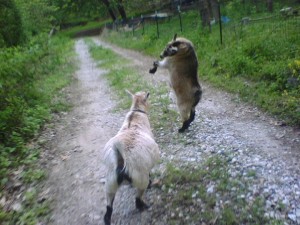
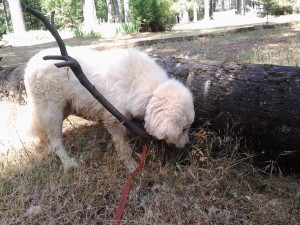
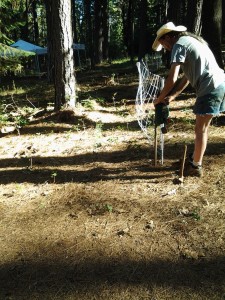

Leave a Reply
You must be logged in to post a comment.